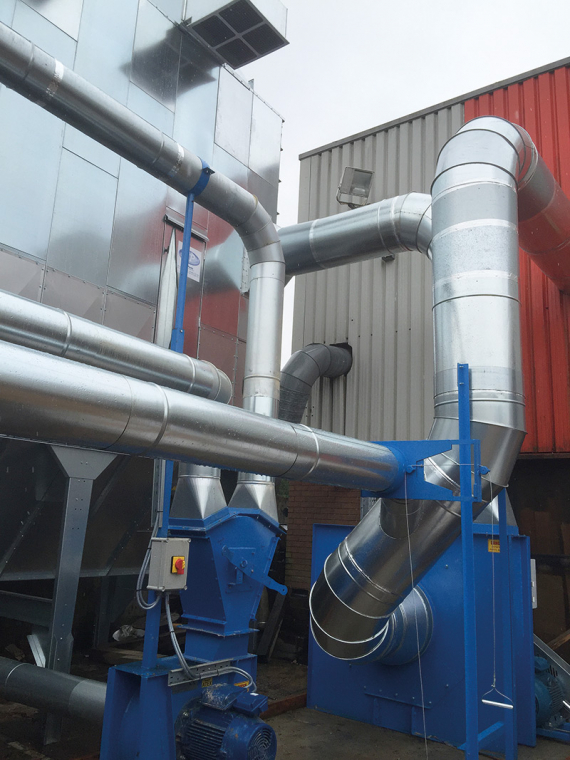Leicester-based dust extractation and control expert, Air Plants, has created a new extraction system for UK Timber which tailors the volume and waste type of each application and delivers a total, low maintenance solution saving on time and space.
Based in Corby, Northamptonshire, UK Timber is a leading supplier of both hardwood and softwood materials and products. The company was looking to improve its levels of extraction and to eliminate the time required to empty its various extractors, ideally being able to discharge waste into a container or trailer for easy disposal and utilise limited space to locate a new filter and fan sets.

There were notable problems with the exisiting set-up. Temporary extraction solutions were no longer fit for purpose and were very labour intensive to empty and maintain. Staff faced the arduous and dirty task of changing over-full bags of waste twice a day. Several dozen one-ton tote bags were taking up room in the yard.
Air Plants specified a Modulair filter and a Baghouse dust collector with 48 500mm diameter XL filter sleeves. The longer sleeve length enables the unit to be located on a smaller footprint without compromising the overall filter area. The 500mm diameter sleeves are designed to handle the high volume of waste produced, which is predominantly oak with fairly high moisture content.
A 30kW main fan is connected to the new suction main, onto which all machine connections, bar one, are fitted with blast gates. This ensures that the suction is directed to the machines in use, eliminating the need for a bigger than necessary main fan.
The extracted waste is transported from the filter by a 300mm diameter rotary screw, which is more reliable than a chain conveyor – this will cope with high volumes of waste in concentrated bursts, and is virtually maintenance free.
A rotary valve releases the waste into a loading fan and then into a trailer with a closed loop transfer system. This returns the air from the trailer, resulting in a sealed system with no leaks to atmosphere.

The whole system is run by a control panel, sequencing the start-up and shut-down procedures and greatly reducing the risk of blockages on restart. On commissioning, the control panel is set up to the individual requirements of each application to ensure the system is tailored to the volume and waste type of each individual application.
In case of a delay in changing the container over, a secondary closed loop divert has been fitted so that waste can be diverted into a chip store in the interim period and avoid production losses. The store is connected to the suction main via a duct fitted with a blast gate, which enables the chip store to be emptied back into the main trailer once it has been changed over.
0116 283 3581
www.airplants.co.uk









